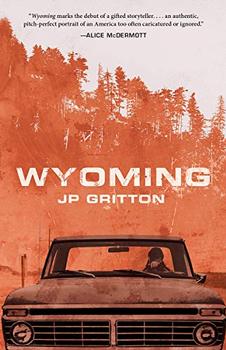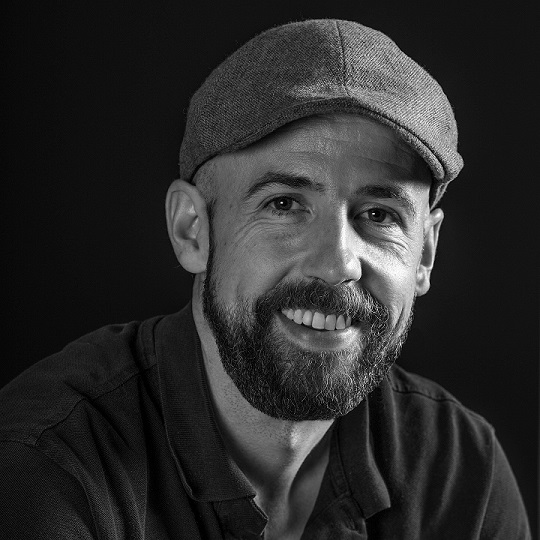Summary | Excerpt | Reviews | Beyond the Book | Read-Alikes | Genres & Themes | Author Bio

 Book Reviewed by:
Book Reviewed by:
Ian Muehlenhaus
Buy This Book
This article relates to Wyoming
 I took some time to ask the author about his background, and the origins and themes of
his unique and tightly-crafted debut novel, Wyoming.
I took some time to ask the author about his background, and the origins and themes of
his unique and tightly-crafted debut novel, Wyoming.
Q: Could you tell me a little about yourself? Where are you from originally, where are you now, and how did you come to write this novel?
I was born in Boulder, Colorado, which was a funky, hippyish town back in the day, and still sort of is. I love Boulder, but being honest I don't know how much growing up there informed this novel. Except, my first job out of college was working on a construction crew all over Boulder Valley. I wrote the opening chapter-or-so for Wyoming over the course of that time, but I figured out pretty quickly that, if I wanted to write and talk about books (which I did), I'd need to go to grad school. After that I bounced around at odd jobs, trying to find something that stuck. Eventually I landed at Duke University, in the English department. Apart from framing houses, it's the first job I've ever liked.
Where did the idea for Wyoming originate? In particular, what or who was the inspiration for your complex and enigmatic protagonist, Shelley Cooper?
I guess it was two things. The first was working construction. At the end of every shift, we'd put away all the tools in a big chest with a heavy lock on it, the reason being that power tools are worth a ridiculous amount of money (and they get lifted all the time). The guys on that crew used to amaze me with how competent, steady and resourceful they were—something about applying that resourcefulness to concealment (for lack of a better word), really fascinated me. I think it must've begun there, in this daily ritual we completed. The other thing was Shelley's voice, which I pretty much lifted (ha!) from my dad's family, who all live in south-central Missouri.
Were there any novels, movies and/or experiences that notably influenced how you wrote this story?
It was hard to be writing a book called Wyoming and not think about Annie Proulx's Bad Dirt and Close Range. I think a lot of writers of the West, especially if their stuff leans "noir," are uncomfortably aware of the shadow Cormac McCarthy throws. There were times I felt like I was re-writing passages of No Country for Old Men, even though the plot and "voice" of the story are very different. But there are a ton of writers of the West—a West divorced from the romantic myths that have grown up around it—whose work has influenced and inspired me: Kent Haruf, Willa Cather, Sherman Alexie, to name just a few.
Why the title Wyoming? Do you have a connection? Or is there a deeper meaning?
Shelley always expects Wyoming to look different, but it never does. There's also this passage in Smith Henderson's Fourth of July Creek that I had wanted to run as an epigraph, in which one of the characters turns "Wyoming" into a gerund (i.e. "to Wyom"). It's a brilliant and painful passage and, in a weird way, rhymes with everything in my book: "Wyoming forever. You could wyom all day and not make any progress. To wyom was to go from nowhere to nowhere. Through nowhere. To see nothing. To do nothing but sit. You turn on the radio and wyom through the dial slowly, carefully in search of a sliver of civilization only to find a man talking about the price of stock animals and feed. You listen to a dour preacher wyoming about your bored and dying and wyoming soul."
To what extent is the Cooper family based on people from your own life?
This is a hard one to answer as a writer, because so much of the composition of a book happens when you're not really consciously aware of the process itself. To say something like, "I heard the voice of a guy named Shelley telling me his story, and I wrote it down," makes you sound crazy, or full of bullshit. And yet, that might be the best way of describing the process of composing this novel.
You play with both time and space in this novel, darting back-and-forth temporally and geographically. Was this a conscious decision from the beginning or something you fell into as you wrote?
The struggle for me was to keep the plot moving forward while credibly reflecting Shelley's interiority at the time. The jumping around in time was, by virtue of the story I wanted to tell, part of every "finished" draft. But that structure became clearer with each iteration. The structure grows partly out of selling the plot—needing to make sure what takes place on the page is in a certain believable order, and that it's interesting—and also out of reflecting the psychology of somebody who's gotten away with this horrible thing.
Did your experience writing short stories influence the form of this novel? Many scenes are visceral, with as much emotional power as a short story. Yet, you deftly tie these together with subtle foreshadowing and cliffhangers. Did you sit down and write this from start to finish or more as shorts that you pieced together?
I've always been more drawn to the form of the novel—telling a long story, and not worrying too much about how many pages it happens to be running—but the struggle in the beginning is connecting with people who will help you get your novel out into the world. One of the few means of doing so available to writers is literary journals, which get read by agents and publishers. Editors of these journals have an understandable preference for stand-alone short fiction. From early on in the process, I was thinking about chapters that could stand alone as short stories: Chapter 1, Chapter 6 and Chapter 12 are all out in different journals. Sometimes I'd sit and re-draft those chapters/stories for a month or two, fiddling with chronology and detail until there was that tautness you mention above. The weird thing was that eventually those edits wound up making their back way into the final manuscript of the novel—my short fiction was feeding off my novel, in other words, and my novel was feeding off my short fiction.
Knowing what you know now about writing a novel, are you excited to write another or are you going to try something else? In other words, can we expect more JP Gritton novels in the near future?
Beyond excited. My next project takes place about ten years after Shelley's story. Among other things, it's a murder mystery. Apart from that, it's the story of Clay, Aileen and Erin Cooper drifting back to Crockett, which is south-central Missouri. Ozark Noir, I guess you'd call it, though it sounds like the market's pretty well cornered on that one.
Photo of JP Gritton, courtesy of the author's website
Filed under Books and Authors
![]() This article relates to Wyoming.
It first ran in the November 13, 2019
issue of BookBrowse Recommends.
This article relates to Wyoming.
It first ran in the November 13, 2019
issue of BookBrowse Recommends.





The Flower Sisters
by Michelle Collins Anderson
From the new Fannie Flagg of the Ozarks, a richly-woven story of family, forgiveness, and reinvention.

The House on Biscayne Bay
by Chanel Cleeton
As death stalks a gothic mansion in Miami, the lives of two women intertwine as the past and present collide.

The Funeral Cryer by Wenyan Lu
Debut novelist Wenyan Lu brings us this witty yet profound story about one woman's midlife reawakening in contemporary rural China.
Your guide toexceptional books
BookBrowse seeks out and recommends the best in contemporary fiction and nonfiction—books that not only engage and entertain but also deepen our understanding of ourselves and the world around us.